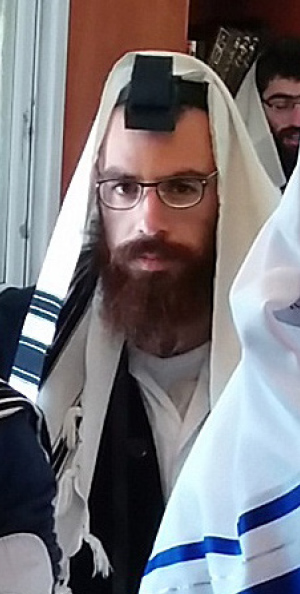“You can do mivtzaim everywhere,” he says, “even with chareidim and knitted kippot types. I have a rule, for example, that we don’t begin until we say the 12 P’sukim and Yechi. That’s my rule, everyone knows it, the teachers and principals.”
 Name: Elad Goldman
Name: Elad Goldman
Age: 28
Married with one child
Location: Netanya
Occupation: Sports director for children and youth
If you ever passed by the sports field belonging to the exclusive school in northern Tel Aviv, and you heard kids warming up for training while singing “Nyet, Nyet Nikavo,” or you heard kids screaming the p’sukim a minute before a sports exercise you could safely assume that their coach is Elad Goldman.
Elad is a sports director for children. He works as an independent consultant and trains kids as part of an extracurricular program in schools and in camps during vacation.
“I spend all day with kids,” he says. “I consider it my shlichus. I can’t always do what I want to do with them openly, so I try to incorporate it in a way that won’t arouse opposition. For example, I take a big box and we decide that it’s a pushka and the children need to aim the ball into the pushka.”
Elad grew up in Haifa. Toward the end of his army service he began becoming religious and keeping Shabbos. He then went to learn in the yeshiva in Ramat Aviv.
“At that time, I was already working as a sports director and teacher of physical fitness in a number of schools. I asked the Rebbe what I should do and opened to clear answers from which I understood that I should continue in my line of work with an emphasis on chinuch. I realized that I was no longer a regular employee. I felt that the Rebbe had assigned me a task and I was a shliach in my work.”
Elad began working at a school in Ramat Aviv.
“I would talk to the children whenever I had free time about the Rebbe, Moshiach, about the world in the time of Geula. The kids were mesmerized by the stories and asked what they could do to make this era begin. Slowly, the children began to make small, good hachlatos like saying Shma before going to sleep or Modeh Ani in the morning, to say the 12 P’sukim, etc. It was moving to see their earnestness and the enthusiasm with which they committed to these mitzvos to hasten the Geula.”
After a period of learning and work/shlichus in Ramat Aviv, he moved to learn closer to home, in the yeshiva in the Chabad house in Achuza. Afterward, he married and moved to Netanya, a good location in between.
Today, Elad runs his own business providing sports training for children. He provides services for schools, youth centers and camps. In his work he trains the children in sports exercise and physical fitness in many schools including religious ones, government-religious, and Chabad schools.
“You can do mivtzaim everywhere,” he says, “even with chareidim and knitted kippot types. I have a rule, for example, that we don’t begin until we say the 12 P’sukim and Yechi. That’s my rule, everyone knows it, the teachers and principals.
“In the summer I coached in an exclusive camp in northern Tel Aviv. Every morning the kids are served rolls with various spreads. I noticed that one of the spreads was chalav akum. I spoke with the director of the camp. She did not see what was wrong with it, it had a hechsher from the rabbanut. We had a shiur on the topic of kashrus and I explained to her what chalav akum is, the lenient opinions, and what Chassidus has to say on the subject. In the end, she changed the spread for one with a Badatz hechsher. So I was able to do mivtza kashrus while on the job.
“I see it as a real shlichus. I write a report to the Rebbe every day about what I did in the course of my work and open to much encouragement and brachos from the Rebbe in the Igros Kodesh. It’s my shlichus and I try to do it as best as I can.”